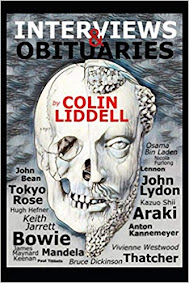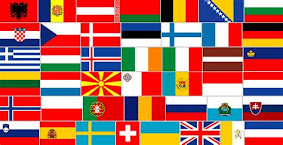"There is something very genuine, very great and very manlike to the Norse system. A kind of vacant hugeness, large awkward gianthood, characterizes the Norse system; enormous force, as yet altogether untutored, stalking helpless with large uncertain strides. Untamed thought; great, giantlike, enormous!"I was pleased to see the essay by Stephen McNallen. While I don't believe in any deities, if I did, it would be in the gods of the Northmen.
~Thomas Carlyle "On Heroes and Hero-Worship"
My last name means "Northman" in Gaelic, so I suppose it's in my blood to some small extent. Even if I were of some other kind of extraction, there is something appealing about the old Norse gods that is missing from other mythological systems. Just as Carlyle said, the Norse gods seem giant, epic, and mighty. All the other kinds of gods I can think of either seem monstrous and sinister (Shintoism, Hinduism, Voodoo) denatured and pathetic (Greek gods, Buddism) or just sort of vague (Taoism, Animism). The gods of the Northmen are giant, honest and brave. They are worth emulating. They're often incredibly silly, but that makes them more endearing to me.
The only thing that comes close for me is the manly Turkic paganism, and it doesn't survive so well, and, besides: I'm not even a little bit Turkish. At least, that's the way I read it: google on the sayings of Dede Korkut some time; it's a book worth your attention, particularly if you enjoyed the sayings of the high one in the Havamal.
These aren't the gods of narrow backed poltroons, or dastardly over civilized urbanites; these are the gods of real men who carved a raw living from the earth, and by hacking gobberts of gore from their enemies' living flesh. They were not smarmy urban stock brokers, vegetable fetishists, or grubby cube-dwelling software developers. For that matter, they weren't even soldiers; they were freebooters, farmers, and hunters. I suppose the original gods of the Vedas and of the Greeks were something very similar to the gods of the Norsemen, but, through the mists of time, they have been corrupted. Certainly, the way the gods are spoken of in Homer is much like enormity of the Norse gods. The stories of the Greek gods are transmitted to us and filtered by centuries of perfumed city-dwelling degenerates, so we now think of Jove as a semi comedic fellow who had sex with a duck and a cow in his attempts to get away from his shrew wife, Hera. Alas the urban thunderer. But with Thor, we get the raw, unexpurgated, red-bearded, wild eyed, hammer wielding original item.
They were not just gods, they were giants! Jotuns; world bestriding colossi who could drink the sea down in one draught, wrestle with old age itself, and lift the serpent that was the root of the world. They were mighty, but not all powerful; even the gods were subject to fate and doom in the end. All mortal men share the same fate; unlike other gods, the Norse gods shared the fate of mortals. In the end, when the great horn sounds, the gods would be eaten by wolves and snakes, their limbs rended by frost giants, and burned alive. That's much worse than most of us can expect from life, but the gods faced their doom with spirit and vigor, and their example inspires us to do the same.
That's really the correct way to face the world; with open-faced honesty, good cheer, vigor, and knowledge of our ultimate doom.
Their imagined afterlife reflected their values; the Christian heaven sounds a lot like the place where cowards would go in the Norse myths. The hall of the kings was reserved for brawling heroes who would feast on boar and mead and party with Valkyries all night long. Until Ragnarok, when they would die again in glorious battle with horrifying monsters.
I don't think the new/old religion of Asatru is going to be as important in 50 years as, say, Mormonism or whatever becomes of the Roman Catholic Church, but I certainly appreciate the spirit of the idea. It is a sort of recreated Shinto for Indo-Europeans. The Norse gods represent the spirit of my ancestors; vigorous, bold, and fearless. I also see them as a sort of tendency and potential within me. I'm very sorry for those Paleoconservatives who are confused or horrified by interest in this sort of thing, but it fits a lot better with my mindset than the various humble faiths they advocate.
Is Norse paganism conservative? Of course it is: the old fashioned virtues embodied by the Norse gods are the most conservative thing I can think of in Western civilization. Is it traditional? Well, probably not explicitly, unless you're a Lithuanian, but the virtues certainly are traditional Western virtues.
I can't speak for anybody else, but I have always considered my generation to have much in common with the pagan barbarians picking through the wreckage of the dead civilization of Rome in the Dark Ages. Like the Germanic barbarians of 1500 years ago, we inhabit the ruins of a dead civilization. We can see the past glories all around us, and we wonder at the fate of the giants who built the place. Yet, we know we're doomed to never in our lifetimes reach the heights of those who came before us. It seems only natural we relate to the fatalistic gods of such men.































